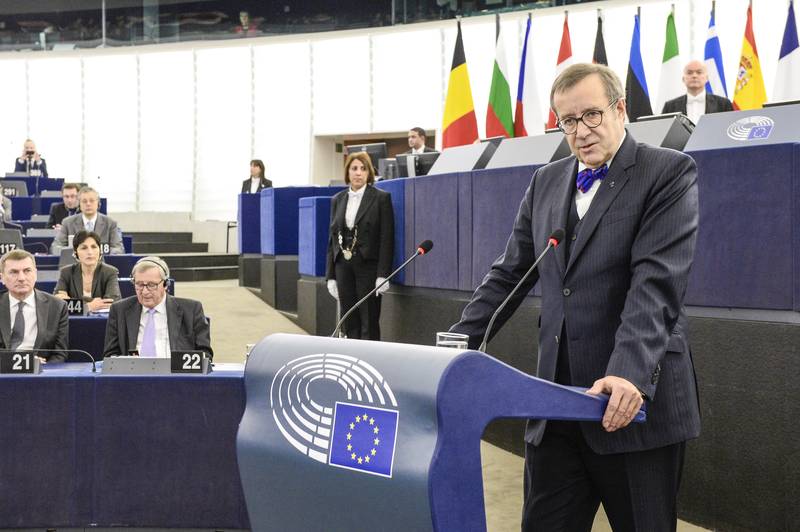Salvation through Innovation
Adelina Marini, November 17, 2011
 For a second year in a row in Bulgaria will take place the international conference Industry and Innovation, which this year will be two days under the topic "Building A Smart and Sustainable Economy". The topic, although not quite new at the European Union level, is extremely timely - in a moment when the perspectives for economic growth for the Union's countries, especially those from the eurozone, are too grim, judging by the autumn forecast of the European Commission. Growth through innovation is the basis of the new 10-year economic strategy of the EU Europe 2020.
For a second year in a row in Bulgaria will take place the international conference Industry and Innovation, which this year will be two days under the topic "Building A Smart and Sustainable Economy". The topic, although not quite new at the European Union level, is extremely timely - in a moment when the perspectives for economic growth for the Union's countries, especially those from the eurozone, are too grim, judging by the autumn forecast of the European Commission. Growth through innovation is the basis of the new 10-year economic strategy of the EU Europe 2020.
No matter the centralised guidelines, there are countries in the EU that do well with innovation, while with others this process is lagging behind. The example of the new technologies, though, gives enough grounds to think that innovation and its implementation in the industry could contribute significantly to the economic growth. But ... as always there is a 'but' and it is that in order for this to happen the countries need to invest significant efforts and resources in education.
The conference has the ambition to seek an answer to the following major questions: "Why are innovations important for Bulgaria's economy?", "Is innovative economy in Bulgaria possible with flourishing enterprises, high employment, sustainable energy and deliveries, attractive environment, as well as first class infrastructure?" and "Where is Bulgaria in terms of the European policy for building innovative economy?"
But before that let's see where is the EU at large
By putting innovations at the centre of its ten-year economic strategy, the EU has in mind something specific - creation of Innovation Union. This means in general focusing on research and innovation in order to fill in the gap between science and business, and inventions to turn into products. The Innovation Union is one of the seven flagship initiatives of the Europe 2020 strategy, the main purpose of which is to create smart, sustainable and inclusive economy. The idea for such a union consists of 30 points, among which is the creation of European Innovation Partnerships, use of public procurement budgets to finance innovation, creation of a European knowledge market for patents and licensing.
In fact the main idea of the Innovation Union is the smooth transfer of scientific potential among member states in order to avoid inequalities and to achieve a common European added value for the economy. In each case, however, when we talk about innovation we should think about the quality of the educational system and its adequacy to the contemporary conditions.
According to the field commissioner, the Irish Maire Geoghegan-Quinn, several  member states have realised the need to harness the crisis to their benefit. You will hardly be surprised that the main EU motor lately, France and Germany, have decided to increase public investment in education, research and innovation, despite the budget cuts. Other countries, like the UK and Spain, have decided to keep their budgets for research stable against the backdrop of severe cuts in other areas. According to Ms Geoghegan-Quinn, these are examples for "smart" consolidation.
member states have realised the need to harness the crisis to their benefit. You will hardly be surprised that the main EU motor lately, France and Germany, have decided to increase public investment in education, research and innovation, despite the budget cuts. Other countries, like the UK and Spain, have decided to keep their budgets for research stable against the backdrop of severe cuts in other areas. According to Ms Geoghegan-Quinn, these are examples for "smart" consolidation.
These words of hers are part of her text for the publication on the issue about innovation of the Centre for European Reform, an independent think-tank, based in London. The innovation commissioner also thinks that what Europe lacks, compared to its key trading partners like the US, Japan, South Korea and China, is a strategic and single approach toward innovation. This, in her words, means "one in which innovation objectives guide policies in relevant areas such as education, skills, labour, product and services markets, and in infrastructure and regional development. Only a handful of member-states pursue such a strategic approach", the EU commissioner writes.
According to Andreas Schleicher from the Organisation for Economic Cooperation and Development (OECD), it is worrying that skills are highly unevenly distributed across Europe to such an extent that substantial numbers of people still do not even reach the minimum levels of basic skills. Moreover, in many countries skills have stagnated or even declined – this at a time when the economic and social costs associated with low skills have been rising.
Where is Bulgaria?
As Nadya Marinova explained on the occasion of the conference, a managing partner of B2B Media (organiser of the event), after last year's first edition of the conference on the website of the Ministry of the Economy appeared a strategic document outlining the basic guidelines for investment in Bulgaria. In this document it is pointed out that the main challenge for the Bulgarian economy "is the fact that the industrial structure at the moment is oriented toward sectors with low added value. No more than 500 thousand people work in sectors with high added value. High education is focused mainly on business and finance, while a relatively small number of students graduate from technical subjects".
 Another important enlightenment of the Bulgarian policy-makers is that Bulgaria faces serious competition in numerous areas. It is weakness, though, that it is still considered that low taxes and labour costs are a competitive advantage. The same is written in the document, the main purpose of which is not to boost innovation but to attract investments. There is some contradiction in noting that you need investments in sectors with high added value and in the same time to point out as an advantage low labour costs.
Another important enlightenment of the Bulgarian policy-makers is that Bulgaria faces serious competition in numerous areas. It is weakness, though, that it is still considered that low taxes and labour costs are a competitive advantage. The same is written in the document, the main purpose of which is not to boost innovation but to attract investments. There is some contradiction in noting that you need investments in sectors with high added value and in the same time to point out as an advantage low labour costs.
The problem with innovation in general is that it is a bit like the English meadow - it needs lasting cultivation and in a moment of forthcoming recession in the entire EU, and bad global economic perspectives, a little more urgent efforts are needed. So, obviously innovation will be needed in developing a strategy that would lead to quick and sustainable results.
 Toomas Hendrik Ilves | © European Parliament
Toomas Hendrik Ilves | © European Parliament | © European Commission
| © European Commission | © EU
| © EU